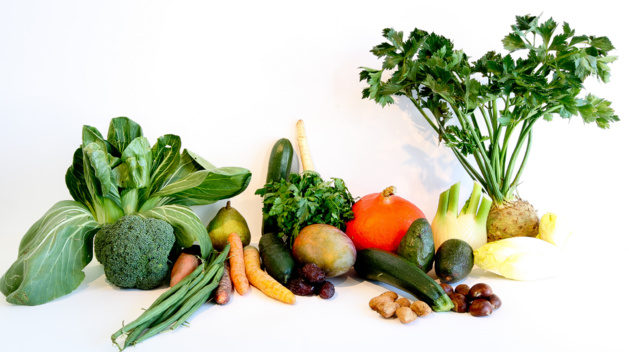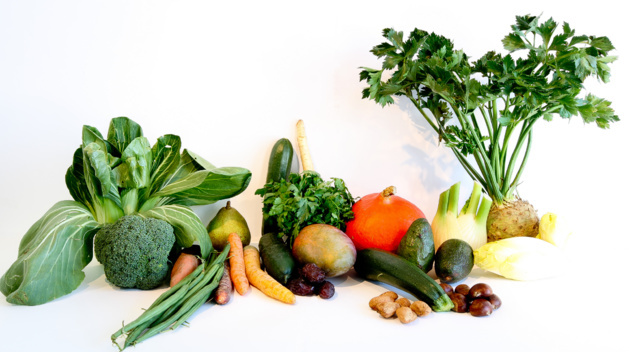
Crédit Rick Ligthelm
Miss Pigut, according to her vegan pseudonym pulled from her blog, PIGUT: Petites Idées pour Grandes Utopies (Small Ideas for Great Utopias) provides cooking classes, makes animations from time to time and writes cookbooks. She agreed to answer a couple of questions to present her vision of veganism to us.
What motivated you to become a vegan? How long have you been one for?
I’ve been a vegetarian since the age of thirteen because, at the time, I didn’t want to eat animals. So for years I’ve been a vegetarian without really trying to understand why or how, but for me it was obvious not to kill animals to eat them. Then 5 years ago, I started to research information on the Internet and saw how animals were treated, especially what happened behind the curtains of the milk and egg industry. Before, I simply did not eat meat or fish; then when I realized what happened to dairy cows and laying hens, I decided step-by-step to become a vegan. At the beginning I didn’t know the word because it is quite a recent concept in France. So I stopped eating eggs and milk; I refused to eat all animal products and then I realized that it existed and that it was known as veganism.
I’ve been a vegetarian since the age of thirteen because, at the time, I didn’t want to eat animals. So for years I’ve been a vegetarian without really trying to understand why or how, but for me it was obvious not to kill animals to eat them. Then 5 years ago, I started to research information on the Internet and saw how animals were treated, especially what happened behind the curtains of the milk and egg industry. Before, I simply did not eat meat or fish; then when I realized what happened to dairy cows and laying hens, I decided step-by-step to become a vegan. At the beginning I didn’t know the word because it is quite a recent concept in France. So I stopped eating eggs and milk; I refused to eat all animal products and then I realized that it existed and that it was known as veganism.
The first criticisms made were related to the fact that plants lack proteins. How do you compensate for this deficiency? And how do you compensate for the absence of vitamin B12?
In fact, proteins aren’t a problem as long as you have a balanced and varied diet. There actually are some proteins in plants; there are even some plants that have the eight essential amino acids. It is true, though, that there are fewer plants in which there is a good balance. There’s soy, quinoa and couple others. However, most plants will have some
some amino acids yet lack others. This is why we need to combine vegetables and cereals, because with both we know that we have such and such amino acid in one and such and such in the other, therefore we have what we call a complete protein. The lack of protein is actually a false issue; as long as we have enough to eat, we have the proteins needed. There are other “hidden” problems by this false issue about proteins; because people are misinformed, they’re afraid about their protein intake and don’t see what could be a real problem.
In fact, proteins aren’t a problem as long as you have a balanced and varied diet. There actually are some proteins in plants; there are even some plants that have the eight essential amino acids. It is true, though, that there are fewer plants in which there is a good balance. There’s soy, quinoa and couple others. However, most plants will have some
some amino acids yet lack others. This is why we need to combine vegetables and cereals, because with both we know that we have such and such amino acid in one and such and such in the other, therefore we have what we call a complete protein. The lack of protein is actually a false issue; as long as we have enough to eat, we have the proteins needed. There are other “hidden” problems by this false issue about proteins; because people are misinformed, they’re afraid about their protein intake and don’t see what could be a real problem.
You don’t mind having to feed yourself at pharmacies?
At the beginning, I didn’t accept it as it was. I wasn’t happy to tell myself “Oh look, I’m going to take a capsule!”, but I realized that people who eat meat take it through animals, so I figured I might as well go to the source myself, since animals eat capsules. They must only assimilate a certain amount, so why not assimilate it myself? And it is true anyway that I don’t want to harm animals, so I’m not going to eat a piece of meat just to have a bit of vitamin B12.
At the beginning, I didn’t accept it as it was. I wasn’t happy to tell myself “Oh look, I’m going to take a capsule!”, but I realized that people who eat meat take it through animals, so I figured I might as well go to the source myself, since animals eat capsules. They must only assimilate a certain amount, so why not assimilate it myself? And it is true anyway that I don’t want to harm animals, so I’m not going to eat a piece of meat just to have a bit of vitamin B12.
Is everything going OK health wise?
I became a vegetarian at a very young age, but by eating haphazardly, but I ended up being ok in the end. My iron was always very low. It has been better since I’ve become a vegan because I pay more attention to what I eat. Animal iron assimilates better than plant iron but at the same time, it seems that animal feed prevents certain absorptions. My vitamin B12 levels had fallen rapidly because I heard about it very late (we see how the false issue of proteins hides real problems!). Therefore I tested my B12 levels and they were rather low. I was hardly a vegan at the time and some omnivorous friends tested their levels as a joke and it happened that some were lacking in B12. It is to be taken seriously. I do a lot of sports.
I became a vegetarian at a very young age, but by eating haphazardly, but I ended up being ok in the end. My iron was always very low. It has been better since I’ve become a vegan because I pay more attention to what I eat. Animal iron assimilates better than plant iron but at the same time, it seems that animal feed prevents certain absorptions. My vitamin B12 levels had fallen rapidly because I heard about it very late (we see how the false issue of proteins hides real problems!). Therefore I tested my B12 levels and they were rather low. I was hardly a vegan at the time and some omnivorous friends tested their levels as a joke and it happened that some were lacking in B12. It is to be taken seriously. I do a lot of sports.
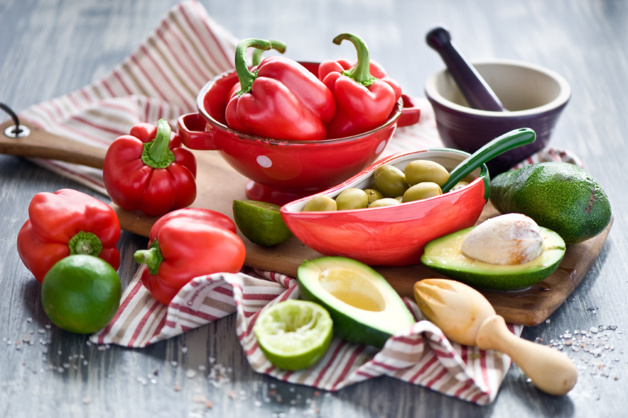
Do you think there are exceptions to this rejection of animal breeding? Would meat produced by a farmer raising his cattle with respect, without giving them hormones, drugs, ect be eatable?
No. I don’t understand how we can kill animals to feed ourselves knowing that we can do without it. Killing an animal is causing harm while it could be fairly treated… It’s true that I prefer this option to the industrial one. The problem is that when this scenario exists, everybody tells themselves that the animal is handled well; however, we’re not constantly watching the breeder so we do not know if it is treated well or not in the end and slaughterhouses are the same for everyone.
No. I don’t understand how we can kill animals to feed ourselves knowing that we can do without it. Killing an animal is causing harm while it could be fairly treated… It’s true that I prefer this option to the industrial one. The problem is that when this scenario exists, everybody tells themselves that the animal is handled well; however, we’re not constantly watching the breeder so we do not know if it is treated well or not in the end and slaughterhouses are the same for everyone.
Do you think that banishing breeding would cause the disappearance of domestic species (mainly because some of them are incapable of feeding themselves)?
It is true that they were "invented" by Man, since they are species that were crossed to obtain an animal that gives more milk. At the same time we imposed certain species to be placed at certain locations, therefore leading to the disappearance of wild animals. Maybe all of this would mix; that these animals would disappear and that others would appear. Maybe some would adapt themselves. I feel more concerned by the suffering of individuals than the future of species.
It is true that they were "invented" by Man, since they are species that were crossed to obtain an animal that gives more milk. At the same time we imposed certain species to be placed at certain locations, therefore leading to the disappearance of wild animals. Maybe all of this would mix; that these animals would disappear and that others would appear. Maybe some would adapt themselves. I feel more concerned by the suffering of individuals than the future of species.
What about the treatment of animals in zoos, circuses and water parks? Do you support the idea that they should be free?
I am completely against all of these places. They are created to generate money. There are arguments pointing out that they are here to save some species, yet there are usually fifty species at risk in a zoo. When we see the amount of species inside, we see it is a false excuse.
Once again, what interests me is not the specie itself, even if it doesn’t please me that some are disappearing, but rather the individual itself. In addition, it is a bit hypocritical because many species disappear because of us and we put them in zoos to preserve them afterwards. I think we could make efforts to create wild areas where we could let them live quietly or something like that. Confining animals in cages in horrible conditions is unacceptable ... A lion does not have the space it needs, nor the heat. It would be better to have nature reserves. It is complicated but they would really need more space.
I am completely against all of these places. They are created to generate money. There are arguments pointing out that they are here to save some species, yet there are usually fifty species at risk in a zoo. When we see the amount of species inside, we see it is a false excuse.
Once again, what interests me is not the specie itself, even if it doesn’t please me that some are disappearing, but rather the individual itself. In addition, it is a bit hypocritical because many species disappear because of us and we put them in zoos to preserve them afterwards. I think we could make efforts to create wild areas where we could let them live quietly or something like that. Confining animals in cages in horrible conditions is unacceptable ... A lion does not have the space it needs, nor the heat. It would be better to have nature reserves. It is complicated but they would really need more space.
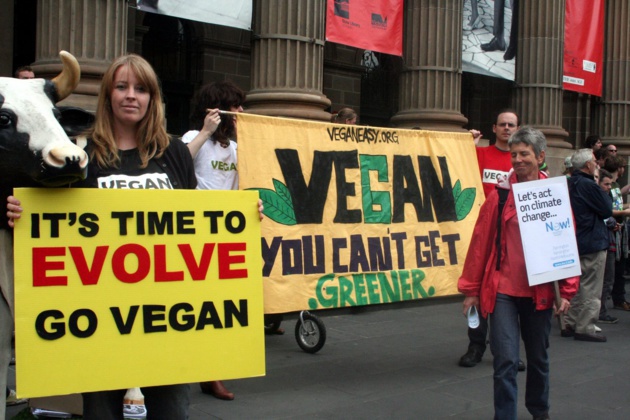
Does the fact that you are a vegan and concerned about environmental issues push you to pay more attention to the origin of the foods you eat? Do you mostly eat organic?
I eat completely organic. This isn’t necessarily the case for all vegans. For me it’s connected without being tied; say that a certain open-mindedness leads to another, and what’s more if the planet is rotting we can’t save animals so it's best to eat organic. I try to be local as much as possible; I have some food coming from far away (eg bananas) but I prefer them to come by boat. I try to be careful; a healthy planet is also important.
I eat completely organic. This isn’t necessarily the case for all vegans. For me it’s connected without being tied; say that a certain open-mindedness leads to another, and what’s more if the planet is rotting we can’t save animals so it's best to eat organic. I try to be local as much as possible; I have some food coming from far away (eg bananas) but I prefer them to come by boat. I try to be careful; a healthy planet is also important.
Does it lead to a significant budget?
I cook everything myself. Cooking is my job; for me eating is important as well as not harming so I still do it whether it’s expensive or not. I don’t earn that much but in the 1950s, we spent approximately 40% of our salaries on food. Today we spend much less and we find it normal. I don’t own an iPod, I don’t buy much, but for me food is important so I spend what’s needed. By visiting local producers, by buying seasonal products ect, there is a way to make it less inconvenient but it’s true that it requires you to be conscious and to do some research, so it’s not so easy whenyou are in a hurry. Personally, I find that it’s worth it.
I cook everything myself. Cooking is my job; for me eating is important as well as not harming so I still do it whether it’s expensive or not. I don’t earn that much but in the 1950s, we spent approximately 40% of our salaries on food. Today we spend much less and we find it normal. I don’t own an iPod, I don’t buy much, but for me food is important so I spend what’s needed. By visiting local producers, by buying seasonal products ect, there is a way to make it less inconvenient but it’s true that it requires you to be conscious and to do some research, so it’s not so easy whenyou are in a hurry. Personally, I find that it’s worth it.
Some speak of a “vegan community”, what does it mean to you?
As a vegetarian, I was alone. My father was a vegetarian but we didn’t share much. I was really the only vegetarian, I don’t even know if it was for animals, I’ve never really known so we feel alone, others being hostile and sniggering. It is quite hard because it is a decision that we take thinking that we are doing something good, so I was quite discreet.
With the Internet, a whole community has built itself up and people have found each other. Many think that vegans are some kind of ‘Parisian Bohos’ full of cash when in fact vegans are everywhere: it’s your neighbor, it’s everyone, people of any social level, people who live in the countryside, in the city and the internet allowed us to communicate: on forums, in social networks. First it allowed us to share with people what we feel it feels like to be a vegan, and it feels good, not to be judged every time we say something but also to go further, to exchange things that we have learned here and there, on this food, think about why we do this or that to that animal. It makes you think philosophically, in theory, in practice, or just enables you to exchange good addresses.
As a vegetarian, I was alone. My father was a vegetarian but we didn’t share much. I was really the only vegetarian, I don’t even know if it was for animals, I’ve never really known so we feel alone, others being hostile and sniggering. It is quite hard because it is a decision that we take thinking that we are doing something good, so I was quite discreet.
With the Internet, a whole community has built itself up and people have found each other. Many think that vegans are some kind of ‘Parisian Bohos’ full of cash when in fact vegans are everywhere: it’s your neighbor, it’s everyone, people of any social level, people who live in the countryside, in the city and the internet allowed us to communicate: on forums, in social networks. First it allowed us to share with people what we feel it feels like to be a vegan, and it feels good, not to be judged every time we say something but also to go further, to exchange things that we have learned here and there, on this food, think about why we do this or that to that animal. It makes you think philosophically, in theory, in practice, or just enables you to exchange good addresses.
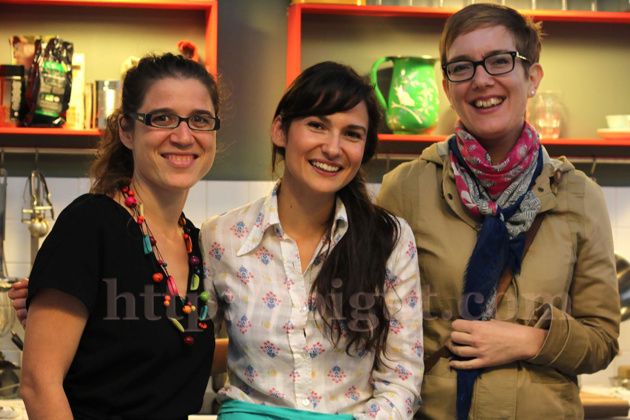
Do you feel that veganism attracts mainly women?
The stereotype of the sensitive woman and the strong man, in addition to the association of veganism with sentimentality rather than force has likely played a role. I think that until recently, men may have been more reluctant to become vegetarian than women. I feel that because of the development of veganism, its popularization and commitment beyond the food it represents, it attracts more and more men. Anyway, there are vegan men and I feel there are more and more of them. Of course, these are only my impressions.
The stereotype of the sensitive woman and the strong man, in addition to the association of veganism with sentimentality rather than force has likely played a role. I think that until recently, men may have been more reluctant to become vegetarian than women. I feel that because of the development of veganism, its popularization and commitment beyond the food it represents, it attracts more and more men. Anyway, there are vegan men and I feel there are more and more of them. Of course, these are only my impressions.
Are you an activist in this ‘fight’?
I think there are plenty of ways to be an activist. I sign petitions all the time. I fight a little every day with my blog by showing people what's out there. When you become a vegan, you always become a bit of an activist just by your consumption. Some go further, for which it is really important to be in the streets all the time to say what they have to say. Quite frankly, I don’t always feel comfortable demonstrating in the streets, so I really choose the events that speak to me the most. When I can’t go myself, I share on social networks for others to go.
I think there are plenty of ways to be an activist. I sign petitions all the time. I fight a little every day with my blog by showing people what's out there. When you become a vegan, you always become a bit of an activist just by your consumption. Some go further, for which it is really important to be in the streets all the time to say what they have to say. Quite frankly, I don’t always feel comfortable demonstrating in the streets, so I really choose the events that speak to me the most. When I can’t go myself, I share on social networks for others to go.
Have you seen many people convert to veganism?
There are more and more people interested in it. It has been going on for a long time but it remained very marginal, I think mainly because vegans were quite marginalized. I know because I was a vegetarian when I was young; 15 years ago, we were set aside and as a result I didn’t dare to go further. We didn’t want to be social outcasts so we hesitated. Then there’s the fact that with the Internet there was more openness, we saw that there were other people, we were not the only ones thinking this way, we can help each other. It is true that there is a new way of cooking, a new way of eating, a new way of life, therefore it gives ideas and everyone feels free to do that.
There are often many changes in social life; there are those who manage to build relationships with their friends. I think they are very open people, who accept that others are different but it's true that when you have friends that are only omnivores, it is obvious that if you start talking about veganism and you want to be understood, every party there’ll be discussions about you, some teasing - not nasty, but you're with your friends, you don’t want to justify yourself, to be a model, to be giving a show, sometimes it seems like we are just unfriendly. And it's true that it's nicer to be with vegans, I don’t hide it because all of a sudden we can talk about something other than veganism. And we don’t necessarily have the same opinion but we can talk and there will not be a wall where people fear that we are trying to convert them. Like any life change, there are people who don’t accept it - for some it is when their friends have a child, when they change jobs or when they become religious. We end up being different and I believe that in France, differences are very badly accepted, whether it is a sexual difference or a difference of origin or value.
There are more and more people interested in it. It has been going on for a long time but it remained very marginal, I think mainly because vegans were quite marginalized. I know because I was a vegetarian when I was young; 15 years ago, we were set aside and as a result I didn’t dare to go further. We didn’t want to be social outcasts so we hesitated. Then there’s the fact that with the Internet there was more openness, we saw that there were other people, we were not the only ones thinking this way, we can help each other. It is true that there is a new way of cooking, a new way of eating, a new way of life, therefore it gives ideas and everyone feels free to do that.
There are often many changes in social life; there are those who manage to build relationships with their friends. I think they are very open people, who accept that others are different but it's true that when you have friends that are only omnivores, it is obvious that if you start talking about veganism and you want to be understood, every party there’ll be discussions about you, some teasing - not nasty, but you're with your friends, you don’t want to justify yourself, to be a model, to be giving a show, sometimes it seems like we are just unfriendly. And it's true that it's nicer to be with vegans, I don’t hide it because all of a sudden we can talk about something other than veganism. And we don’t necessarily have the same opinion but we can talk and there will not be a wall where people fear that we are trying to convert them. Like any life change, there are people who don’t accept it - for some it is when their friends have a child, when they change jobs or when they become religious. We end up being different and I believe that in France, differences are very badly accepted, whether it is a sexual difference or a difference of origin or value.














